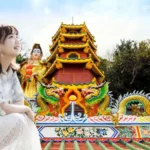Bertolt Brecht’s play The Good Woman of Szechuan explores complex themes of morality, capitalism, and human nature through its characters and setting.
The title itself is a critical element that encapsulates the play’s core messages and thematic explorations.

Here is a detailed examination of the significance of the title, highlighting its multifaceted implications:
1. Connotations of “Good”
The word “good” in the title is significant in multiple ways:
Shen Te: “You have to be good to be allowed to live in Szechuan. But it is hard to be good.”
(Scene 4)
Moral Ambiguity:
The term “good” is inherently subjective and open to interpretation. Brecht challenges the audience to reconsider what constitutes goodness in a society plagued by economic inequality and moral corruption.
Shen Te, the protagonist, attempts to be “good” in a conventional sense by helping others and acting with compassion.
Shui Ta (Shen Te’s alter ego): “One cannot stay good unless one is able to keep one’s head above water.”
(Scene 6)
However, the societal pressures and harsh realities force her to adopt the alter ego of Shui Ta, who employs ruthless pragmatism to survive and protect her benevolent self. This duality questions whether goodness can sustain itself in a corrupt world.
Irony and Critique:
Shui Ta: “The world can stay as it is if enough people are found who will say ‘yes’ to it.”
(Scene 8)
The title carries a degree of irony, as the play demonstrates that maintaining goodness is virtually impossible without compromising one’s morals.
Brecht critiques societal structures that make true goodness unattainable, suggesting that systemic change is necessary for individual goodness to flourish.
2. Geographical and Cultural Context: “Szechuan”
The use of “Szechuan” (a province in China) is loaded with cultural and thematic implications:
Exotic Setting:
By setting the play in Szechuan, Brecht creates an exotic backdrop that distances the audience from their immediate reality, facilitating a critical examination of universal issues.
This aligns with Brecht’s concept of the Verfremdungseffekt, or “alienation effect,” which aims to prevent the audience from becoming too emotionally involved and instead encourages critical reflection on the social issues presented.
Shen Te: “The world is such a small place when you are alone.”
(Scene 9)
Symbolism of Szechuan:
Szechuan, being a real yet distant and somewhat abstract location for Western audiences, symbolizes the universality of the play’s themes. The issues of exploitation, morality, and capitalism are not confined to a specific location but are global phenomena.
Cultural Otherness:
The setting in a non-Western locale allows Brecht to explore and critique his own society’s flaws from an external perspective, using the guise of examining another culture to reflect on Western capitalist and moral shortcomings.
3. Character and Theme: The Good Woman (Shen Te)
Duality of Shen Te and Shui Ta:
Shen Te, the “good woman,” embodies kindness and altruism, but these qualities are unsustainable in her harsh environment.
Shen Te: “It is hard to be good when you are so badly off.”
(Scene 4)
Her transformation into Shui Ta, a shrewd and calculating businessman, underscores the conflict between personal goodness and societal survival.
This duality reflects the title’s emphasis on the struggle to maintain goodness in an unforgiving world.
Feminine Virtue and Stereotypes:
The title evokes traditional notions of female virtue and the expectation for women to embody goodness and self-sacrifice.
Brecht subverts these stereotypes by illustrating that such expectations are unrealistic and often detrimental, highlighting the societal pressures that force women, and individuals in general, to compromise their values.
4. Critique of Capitalism and Morality
Capitalist Critique:
The play critiques capitalist structures that necessitate ruthless competition and exploitation. The title’s emphasis on “goodness” questions whether moral integrity can coexist with the demands of a capitalist society.
Shen Te: “To be good to you means to be good to myself.”
(Scene 5)
Brecht uses the plight of Shen Te to illustrate how economic pressures corrupt and coerce individuals into abandoning their ethical principles.
Moral Dilemma:
The title frames the central moral dilemma of the play: can one remain good in a society that rewards selfishness and punishes altruism?
Shen Te’s struggle represents the larger conflict between ethical ideals and practical survival, challenging the audience to reflect on the systemic forces that shape human behavior.
5. Religious and Philosophical Dimensions
Spiritual Quest:
The title may allude to religious and philosophical explorations of goodness and virtue. The gods in the play seek a truly good person, reflecting a quest for moral purity that is thwarted by societal imperfections.
Shui Ta: “I could not have survived had I been the good woman I was meant to be.”
(Scene 10)
This pursuit of goodness becomes a philosophical inquiry into the nature of morality and its place in a flawed world.
Critique of Religion:
First God: “Good intentions bring their own reward.”
(Prologue)
Brecht also critiques religious concepts of goodness that are disconnected from real-world complexities. The gods’ naïveté and ultimate failure to find a solution emphasize the inadequacy of traditional moral teachings in addressing systemic social injustices.
Conclusion
The title The Good Woman of Szechuan is a multifaceted and richly layered element that encapsulates the play’s exploration of morality, societal critique, and the human condition.
It challenges the audience to consider the complexities of being “good” in a world that often punishes virtue and rewards selfishness, while also questioning the societal structures that dictate these moral dilemmas.
Through the character of Shen Te and the setting of Szechuan, Brecht invites a critical examination of the forces that shape human behavior and the possibility of genuine goodness in an imperfect world.













